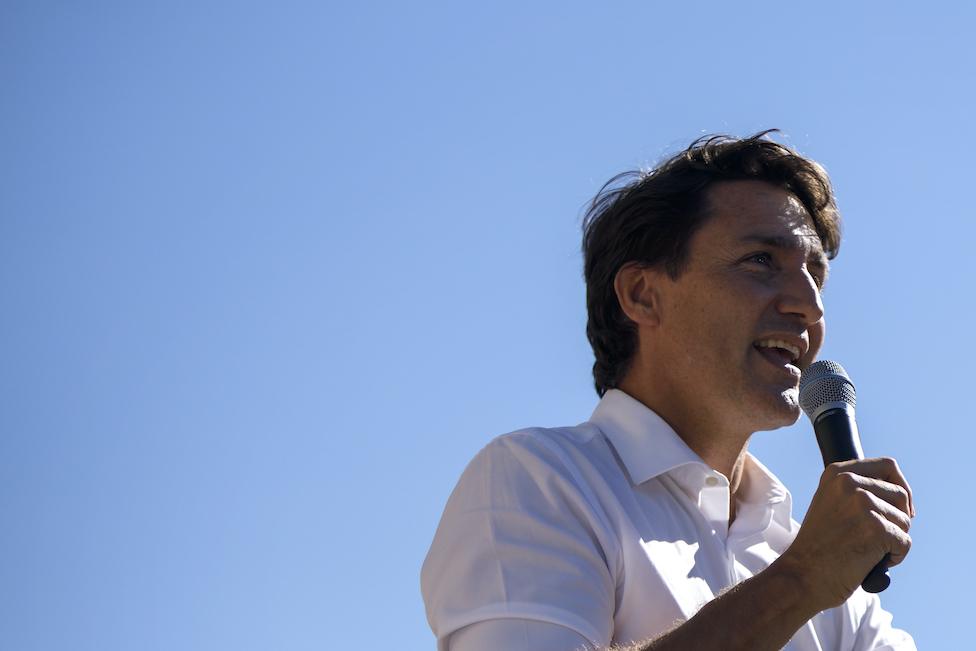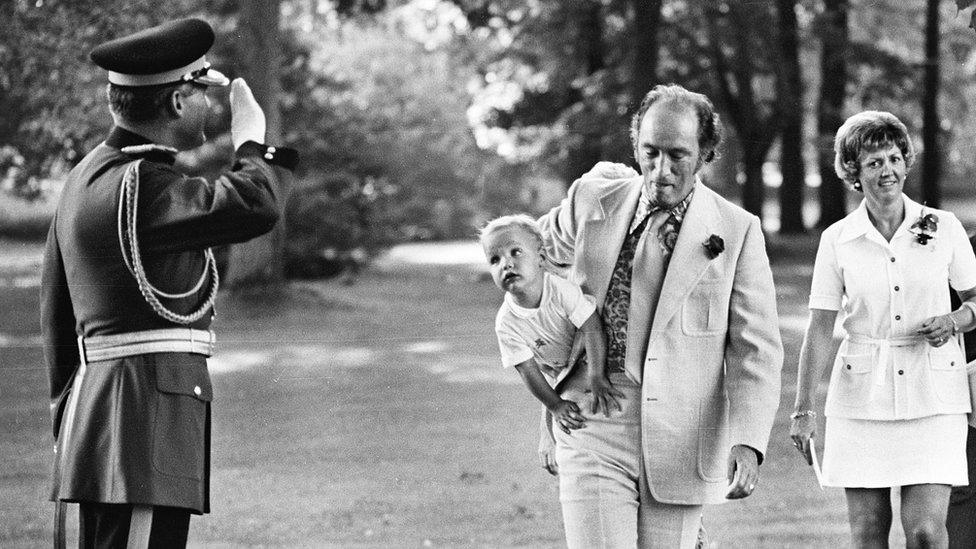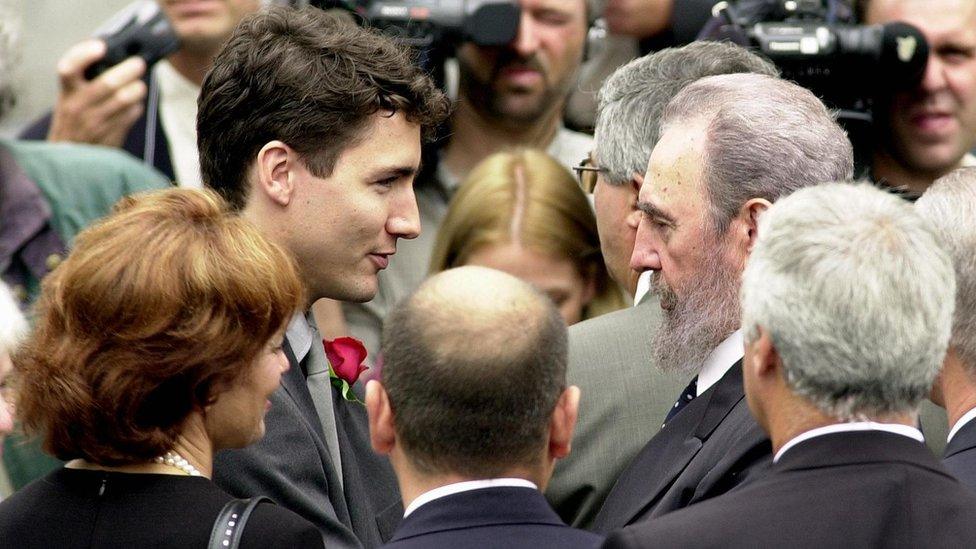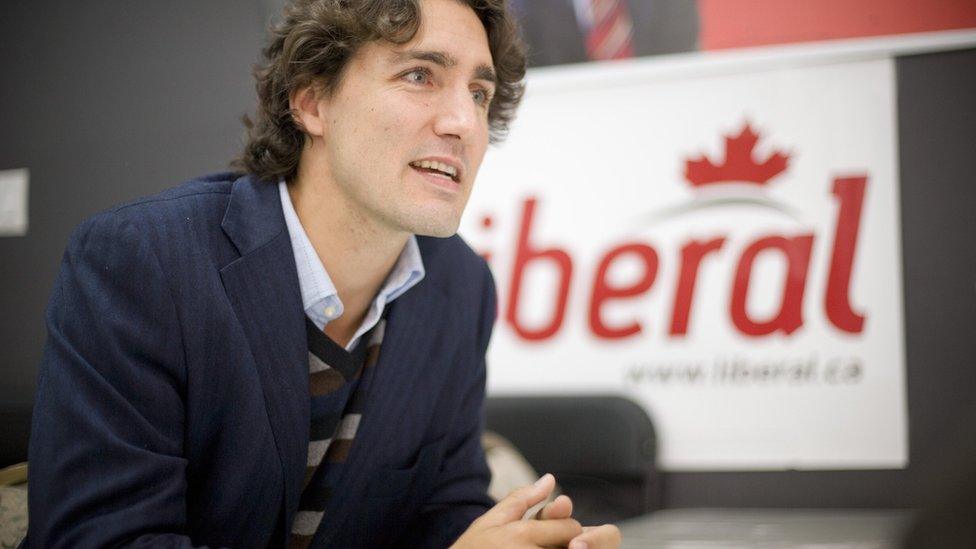Justin Trudeau: A life in politics
- Published

The biggest night of Justin Trudeau's political life is about to unfold, with his job on the line as he seeks a parliamentary majority. But first, who is the Liberal leader and what change has he brought to the country since 2015?
The 49-year-old hopes to lead his party into a third term in office, after two years dominated by the public health crisis.
After that stunning rise to power six years ago, his first term and the realities of governing took the shine off his reputation as a beacon for the left.
He narrowly won a second term, but the 2019 election saw his power reduced.
Two years later this snap election could provide him with the mandate he seeks - or be his downfall.

A young Justin Trudeau in 1973 with his prime minister father
Born to lead
When Justin Trudeau was just four months old, then-US President Richard Nixon predicted the infant would one day follow in his father's footsteps.
At a gala dinner during a state visit to Ottawa in 1972, Mr Nixon addressed his Canadian counterpart: "Tonight we'll dispense with the formalities. I'd like to toast the future prime minister of Canada: to Justin Pierre Trudeau."
According to CBC, the elder Trudeau responded that should his son ever lead the country, "I hope he has the grace and skill of the president."
While Mr Nixon's political career, of course, ended in disgrace, Mr Trudeau went on to dominate Canadian politics until the mid-1980s, provoking passionate and polarising opinions.
His first election in 1968 inspired a frenzied fandom among young voters that became known as "Trudeaumania". And his administration included many historic accomplishments like making both French and English the official languages of the federal government.

Justin Trudeau and former Cuban leader Fidel Castro at Pierre Trudeau's funeral in 2000
His own path
Justin lived much of his childhood in the public eye. The family's security detail gave him the codename "Maple 3".
But as he grew up he shied away from politics. He attended McGill University then the University of British Columbia, where he earned a degree in education. He became a teacher.
In 1998, his youngest brother Michel was killed in an avalanche in British Columbia. That tragedy forced him into the public spotlight and he became a spokesman for avalanche safety.
When his father died two years later at the age 80, Mr Trudeau delivered the eulogy at the nationally televised funeral. His speech was widely praised and led many to ponder his potential for public office for the first time.
He married his wife Sophie Gregoire, a Quebecois television and radio reporter, in 2004. They have three children.

Mr Trudeau in 2008
Political beginnings
Mr Trudeau became more politically active following his father's death. He won the Liberal nomination in the Papineau riding in 2007 and became MP in 2008. Even at this early point he was seen as leadership material for the Liberal party.
He was re-elected as MP in 2011.
After declining to run for leadership of the Liberal party several times, Mr Trudeau finally declared his intention to run in 2012. During the campaign, he was criticised by his opponents for his inexperience and lack of policy positions - the same line of attack used in this general election campaign - but won the position in a landslide in 2013.
A bumpy first term
Mr Trudeau swept into power in 2015 promising "real change" and a slew of progressive pledges.
According to an independent assessment by two dozen Canadian academics, Mr Trudeau kept - fully or partially - 92% of these promises in his first term, the most by any Canadian government in 35 years.
But in his first four years, he faced criticism from the left and right.
Four years of Justin Trudeau in two minutes
His environmental record, for example, was undercut by his support for the Trans Mountain oil pipeline expansion project.
And Mr Trudeau's vow to institute federal electoral reform was quickly abandoned, angering some left-leaning voters excited by the prospect of seeing an alternative voting system
There was also scandal. Three instances of him wearing blackface - widely accepted as racist caricatures - landed like a bombshell in the Canadian election campaign. But he was contrite and voters seemed to accept his apology and moved on.
Perhaps more corrosive was the SNC Lavalin affair, in which Mr Trudeau was accused of pressuring his former attorney general to cut a deal with a company facing corruption charges.
Jody Wilson-Raybould, the former attorney general, said the prime minister and his staff spent months trying to convince her that taking the company to trial would cost Canadians jobs, and their party votes.
Mr Trudeau's popularity took a knock as a result but in the 2019 election his party had enough support in the big cities to scrape home.
Mocking Trump, then the pandemic
His second term began with a diplomatic incident when he was caught on camera mocking President Donald Trump, who responded by calling him "two-faced".
A few months later, he gave an epic pause when asked by reporters about the US president.
Trudeau's epic pause when asked about US protests and President Trump's response
There was another scandal, this time involving a charity with family connections to the Trudeaus, but he was cleared of any wrongdoing by the ethics watchdog.
The pandemic was his big test - it's been a tough 18 months for the country. His worst period was when the vaccinations got over to a terribly slow start but Canada now has one of the highest vaccination rates in the world.
When he called the election it looked like the country was past the worst but then the Delta took hold again and his party's popularity took a hit.
If the Liberals don't win the 15 extra seats needed for a majority, questions will be raised about Trudeau's future.